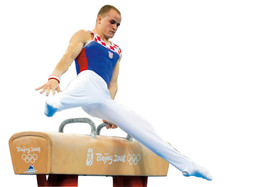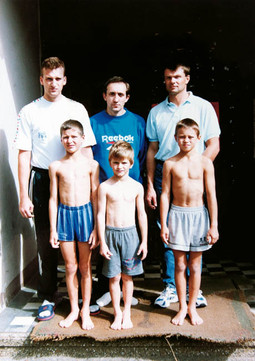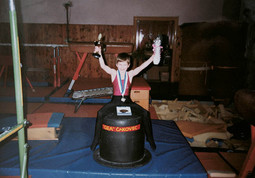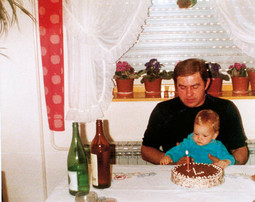Published in Nacional number 666, 2008-08-19
The path to success for the Croatian Olympian
Gymnastics hero from Cakovec
Filip Ude (22) is winner of the first ever Olympic medal in gymnastics for Croatia; his mother tells Nacional about the thorny road to the top
 Filip Ude achieved fantastic success in Beijing, the result of years of sacrifice and hard work Croatia has never had much success in the basic sports: swimming, gymnastics and athletics. While things are starting to change in swimming, and Blanka Vlasic is still an isolated case in athletics, it seems as though Croatia has never had much success in gymnastics. Until three years ago, there was only one poorly equipped gymnastics facility in Croatia, and the only gymnast to ever represent Croatia in the Olympics was Aleksey Demjanov, a Russian with a Croatian passport who participated in the Athens Games. Despite this, 22-year old Filip Ude from Cakovec has become one of the world’s best gymnasts, and on Sunday took the Olympic silver medal in the pommel horse. This fantastic success is the result of his exceptional talent, his excellent coaches Mario Vukoja from Cakovec and Russian Igor Kriajimski, who moved to Cakovec with his wife to coach Ude. Filip Ude already achieved excellent results as a junior, and at the age of 18, he won the silver medal at the European Championships. Earlier this year, he won the European silver on the pommel horse in Lausanne.
Filip Ude achieved fantastic success in Beijing, the result of years of sacrifice and hard work Croatia has never had much success in the basic sports: swimming, gymnastics and athletics. While things are starting to change in swimming, and Blanka Vlasic is still an isolated case in athletics, it seems as though Croatia has never had much success in gymnastics. Until three years ago, there was only one poorly equipped gymnastics facility in Croatia, and the only gymnast to ever represent Croatia in the Olympics was Aleksey Demjanov, a Russian with a Croatian passport who participated in the Athens Games. Despite this, 22-year old Filip Ude from Cakovec has become one of the world’s best gymnasts, and on Sunday took the Olympic silver medal in the pommel horse. This fantastic success is the result of his exceptional talent, his excellent coaches Mario Vukoja from Cakovec and Russian Igor Kriajimski, who moved to Cakovec with his wife to coach Ude. Filip Ude already achieved excellent results as a junior, and at the age of 18, he won the silver medal at the European Championships. Earlier this year, he won the European silver on the pommel horse in Lausanne.
He has also won medals in the World Cup, so that the silver medal in Beijing is not a huge surprise for those well acquainted with the sport. Not even for his month, 61-year old Miljenka Ude, who watched the final competition at the Aton Gymnastics Centre in Nedelisce near Cakovec. This facility, opened only three months ago, is the most modern gymnastics training facility in Croatia. With mother Miljenka were her daughters, 27-year old Iva and 36-year old Nives with their children and friends, and everyone was in a trance when Filip won the silver medal. Only after she wiped away her tears, his mother Miljenka Ude described his childhood and his path to the Olympic medal. “While he was in preschool, Filip was jumping all over the furniture. When he started the first grade, we signed him up in the local gymnastics club. Today’s director of the club, Marko Vukoja, was then a coach who was trying to get kids interested in gymnastics. When Filip started school, he raised his hand and signed himself up, even though I think he had no idea what gymnastics was.
“After that, he wanted to do other sports too, but I kept directing him towards gymnastics. I knew that if he did other sports too, in the end he would leave them all. When he started winning his first medals, then he really became committed to gymnastics,” recalled Miljenka, who then did not believe that her son could seriously train this sport.
“For me, it was most important to keep him out of bad company, to be sure that he was at training from 6 to 9 pm, and that I could pick him up at 9. True, Marko Vukoja immediately told me that Filip was talented. When he enrolled, Filip took a competency test, and Vukoja told me that he had passed it with a grade of 100%.
 Igor Kriajimski (in the blue shirt) came to Cakovec to train Filip at the urging of Mario Vukoja “However, I never though about any medals, I never had any hopes, for me it was just important that he was in training and not on the street,” said Miljenka, who admits that Filip’s approach to gymnastics only became serious when he began winning at competitions. “The first medals were clay club medals, which are dear to me even today, while my favourite was his first, which I think was made of chocolate. After he began winning medals at state championships, he wasn’t interested in anything other than gymnastics,” she recalled.
Igor Kriajimski (in the blue shirt) came to Cakovec to train Filip at the urging of Mario Vukoja “However, I never though about any medals, I never had any hopes, for me it was just important that he was in training and not on the street,” said Miljenka, who admits that Filip’s approach to gymnastics only became serious when he began winning at competitions. “The first medals were clay club medals, which are dear to me even today, while my favourite was his first, which I think was made of chocolate. After he began winning medals at state championships, he wasn’t interested in anything other than gymnastics,” she recalled. Filip’s start in gymnastics came at the same time as a family tragedy, the death of his father. That was in 1993, Croatia was at war, the family income was small, and Miljenka Ude was left to raise her three children. At that time, Nives was 21, Iva was 12 and Filip was 7.
“I have been a single parent since 1993, the same year Filip started to train gymnastics. One salary, three children. There is a big age difference between my oldest daughter and Filip, 14 years, and she was already at college when Filip started school. Of course, my daughters took care of him when I couldn’t, and Nives often took him to training. I had three kids to take care of, and in the end I succeeded,” Miljenka proudly stated. She also said that Mario Vukoja played a key role in Filip’s sporting life, but in his personal life as well. “I have to thank Mario Vukoja for everything, because he was a brother, friend, father, everything to us. I always say that I will be grateful to him for as long as I live. He took care of Filip’s schooling, and helped him in the subjects that he found difficult,” she said.
 Filip Ude Considering that there was not an appropriate facility for gymnastics in Cakovec, Vukoja suggested that Filip train in Russia for a month, under better conditions and under stronger competition, to check Filip’s capabilities. However, it was difficult to find money to send him to Vladimir in Russia, a city with a population of 300,000. “I was alone with my three children. I remember when I had to give 2000 kuna for the plane ticket for Russia, and I had to figure out a way with my cheques. It took me two or three years to recover from that plane ticket. But I never regretted it, especially when Mario Vukoja told me that Filip had excellent potential and that if he worked hard, he could win medals at the European, world and Olympic medal. That wasn’t very important to me, even though silently, I believed what he told me. I had complete trust in Vukoja, I put my child in his hands, or more precisely, we looked after him together. For me, the most important thing was to keep Filip out of bad crowds, because he was very lively and unpredictable,” recalled Miljenka.
Filip Ude Considering that there was not an appropriate facility for gymnastics in Cakovec, Vukoja suggested that Filip train in Russia for a month, under better conditions and under stronger competition, to check Filip’s capabilities. However, it was difficult to find money to send him to Vladimir in Russia, a city with a population of 300,000. “I was alone with my three children. I remember when I had to give 2000 kuna for the plane ticket for Russia, and I had to figure out a way with my cheques. It took me two or three years to recover from that plane ticket. But I never regretted it, especially when Mario Vukoja told me that Filip had excellent potential and that if he worked hard, he could win medals at the European, world and Olympic medal. That wasn’t very important to me, even though silently, I believed what he told me. I had complete trust in Vukoja, I put my child in his hands, or more precisely, we looked after him together. For me, the most important thing was to keep Filip out of bad crowds, because he was very lively and unpredictable,” recalled Miljenka.
That was a key moment in Filip’s career. In Russia, Vukoja met coach Igor Kriajimski. Miljenka Ude says that was very important, because Vukoja was honest to admit that Filip was advancing quickly, too quickly for him to be able to keep up. That’s why he decided to bring Kriajimski to Cakovec. “There was a small gymnastics centre in Cakovec. When Kriajimski came from Russia and say that centre, he said it was a storage bin, and not a gymnastics centre. In this centre, Filip would train the vault by starting his run in the bathroom, running through the hallway and then jumping. That is why he went off to Russia for a month, first at the age of 10 and then at the age of 11. That is where Vukoja met Igor Kriajimski, who he later invited to come to Cakovec. They had a difficult time in convincing him to stay, because it was obvious that this was a big step down for Kriajimski. In the end, he never regretted his decision, and since 1999 has lived in Cakovec with his wife Tatjana. When Filip was 12 years old, they began doing training in Bratislava, where he would spend about 3 months out of the year,” recalled Miljenka. Filip Ude advanced quickly and in 2004, when he was 18, he was already a candidate for the Olympic in Athens, but he failed to qualify.
Gymnastics, like all individual sports, requires a lot of money that the Ude family did not have. But with the first successes came the first sponsors. The first was the Vajda Meat Industry from Cakovec. “I was employed there and my director made it known to me that the company would be willing to sponsor the gymnastics club, as many children had enrolled. When Filip started winning medals, other sponsors also appear. Vajda Meats was the main sponsor, but later Euroherc and others joined it. But Vajda was key at the time Filip started training in Bratislava, when we really needed the money. I have no idea how they started training in Bratislava, you’d have to ask Vukoja that,” she said
 Filip Ude with his father Ivan, who passed away in 1993 Over time, Filip became more serious and was no longer the brat who broke things in the hous. “Today, Filip is the complete opposite. He calmed down in high school, and was no longer even one per cent of the kind of boy he had been. He was a very good student in elementary and high school, which again is thanks to Vukoja. The gymnastics club is a family club, and all of the parents are close, even with the club’s president and director. We all help each other out,” she said. Her biggest concern was food, as Filip always loved his mother’s cooking. “I always cooked what he loved the most. At home, he was privileged, and we always ate whatever he wanted. I remember when he came back from the World Cup in Moscow two months ago, he called me and said, ‘Mom, can you make me chicken and homemade pasta?’ While he was in Bratislava, his coach Igor Kriajimski cooked for him, mostly chicken and rice. There, his coach 01xfwas everything to him: mom, dad, cook, psychologist, friend. I know the first thing he’ll eat when he comes home from Beijing: fried turkey, croquettes and cucumber salad. He’s already told me that he can hardly wait to get back to my cooking,” she said proudly.
Filip Ude with his father Ivan, who passed away in 1993 Over time, Filip became more serious and was no longer the brat who broke things in the hous. “Today, Filip is the complete opposite. He calmed down in high school, and was no longer even one per cent of the kind of boy he had been. He was a very good student in elementary and high school, which again is thanks to Vukoja. The gymnastics club is a family club, and all of the parents are close, even with the club’s president and director. We all help each other out,” she said. Her biggest concern was food, as Filip always loved his mother’s cooking. “I always cooked what he loved the most. At home, he was privileged, and we always ate whatever he wanted. I remember when he came back from the World Cup in Moscow two months ago, he called me and said, ‘Mom, can you make me chicken and homemade pasta?’ While he was in Bratislava, his coach Igor Kriajimski cooked for him, mostly chicken and rice. There, his coach 01xfwas everything to him: mom, dad, cook, psychologist, friend. I know the first thing he’ll eat when he comes home from Beijing: fried turkey, croquettes and cucumber salad. He’s already told me that he can hardly wait to get back to my cooking,” she said proudly.
Today, there is nothing that the family would not do for Filip, and they often accompany him to his competitions. In the start, they would cheer for him at national competitions, then at competitions in neighbouring countries and last year, at the World Championships in Stuttgart, when he qualified for the Olympics, they filled two vans and drove there. Thanks to all his success, a modern gymnastics facility has been built in Nedelisce, where Filip and a hundred other kids can train. Filip has also enrolled in the Faculty of Kinesiology in Zagreb, but due to his frequent trips abroad, his student status is on hold.
Latest news
-
28.10.2010. / 14:15
'A profitable INA is in everyone's interest'
-
28.10.2010. / 09:38
Sanader’s eight fear SDP — Won’t bring down Government
-
21.10.2010. / 15:02
Interior Ministry turned a blind eye on Pukanic assassination
-
20.10.2010. / 09:34
Barisic could bankrupt HDZ



